bus v. buzz
« previous post | next post »
In a post a couple of days ago ("PSDS", 3/30/2014), I observed that in English, "Syllable-final (and especially phrase-final) /z/ is usually voiceless". In a comment, Mark F. asked
[A]re "buzz" and "biz" just isolated counterexamples to the generalization about syllable-final /z/, or is it generally false for accented syllables? Or do I just think I pronounce the /z/?
The answer depends on what Mark means by "pronounce the /z/". I'd put it this way: in phrase-final position, he probably pronounces the /z/ in buzz, but pronounces it mostly like an [s], even though the difference between bus and buzz remains perfectly clear.
Here are the Merriam-Webster online dictionary pronunciations for bus and buzz. (I've concatenated them artificially — M-W's speaker(s) presumably read them many items apart in a long list of items to be read for use in the dictionary.)
If we listen just to the last 150 milliseconds of (that pronunciation of) buzz, amplified a bit, it sounds like this:
And if we listen to everything in buzz up to the point where that s-like section starts, we get
This is just one example, but it's a typical one. Here's race vs. raise from the same source (but in the voice of a different speaker):
As before, the main differences between /s/ and /z/ in this context are:
- The vowel before /z/ is much longer.
- The voiceless fricative noise associated with /z/ is shorter and weaker.
- The pitch contour in the /z/-final syllable reaches a low target and stays there for a while.
- There is a short segment of voiced frication in the transition between the vowel and the final /z/, which is slightly longer than the comparable segment in /s/.
Now, English is not a tone language, and so the tonal difference is reliable only in this context, i.e. a phrase-final stress syllable with a falling nuclear accent. Things would be different with given a final rise, or a phrase-medial syllable. And in phrase-medial position before a following vowel, English /z/ might really be [z], pretty much. Here's TEST/DR3/MGLB0/SI1534.wav from the TIMIT corpus — "Is it because of my slovenliness that hair grows on my face?"
If we zero in on the first few words, we see that the /z/ in "is it" ( = /ˈɪz.ɪt/) is voiced almost all the way through, and similarly the /z/ in "because of" (= /biˈkɔz.əv/):
Likewise the /z/ in "grows on" (= /ˈgroz.ɔn/):
(By the way, this apparently odd choice of example sentence — similar to the finest vintage effle — made its way into the TIMIT collection from p. 100 of Guy Endore's 1961 novel Voltaire! Voltaire!, by way of the Brown Corpus.)
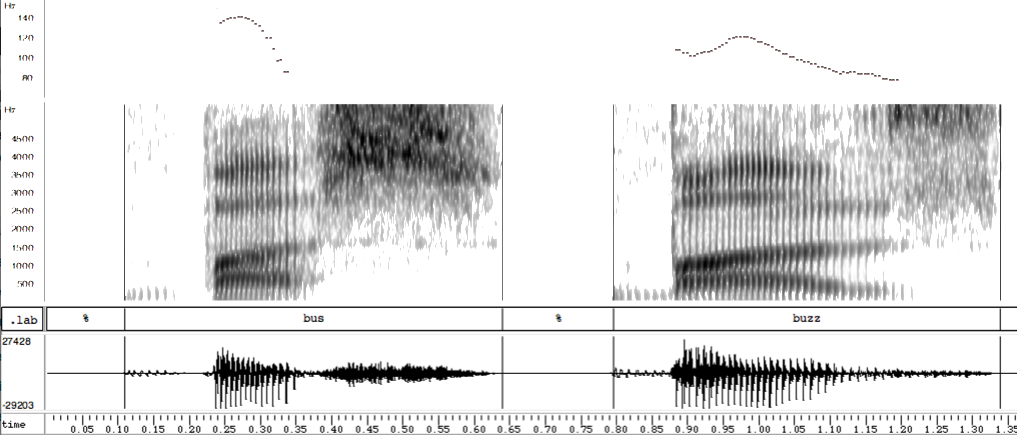
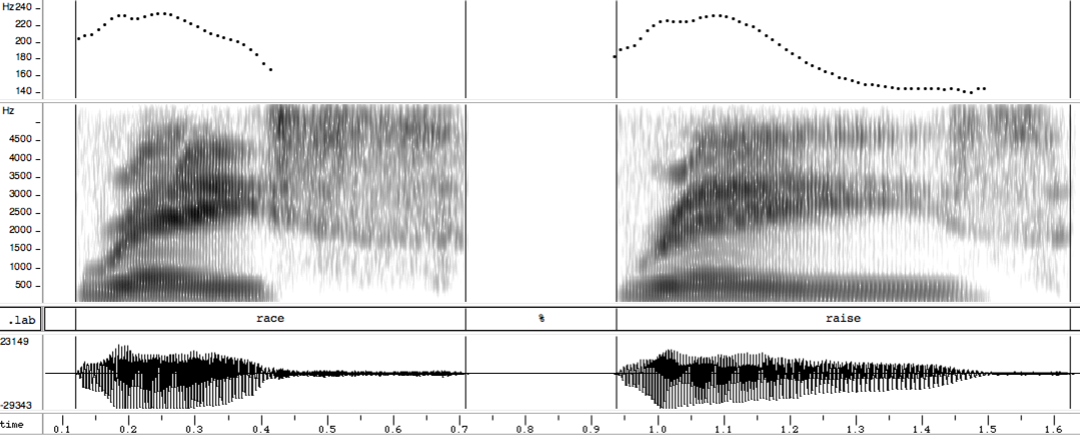
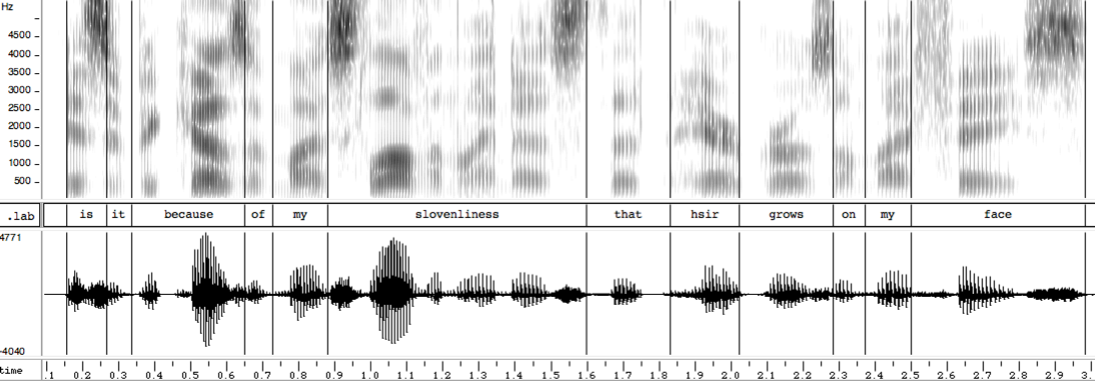
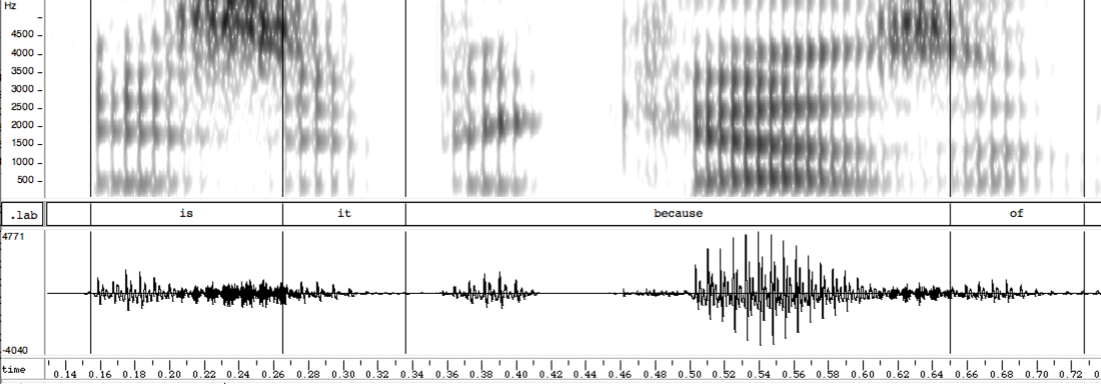
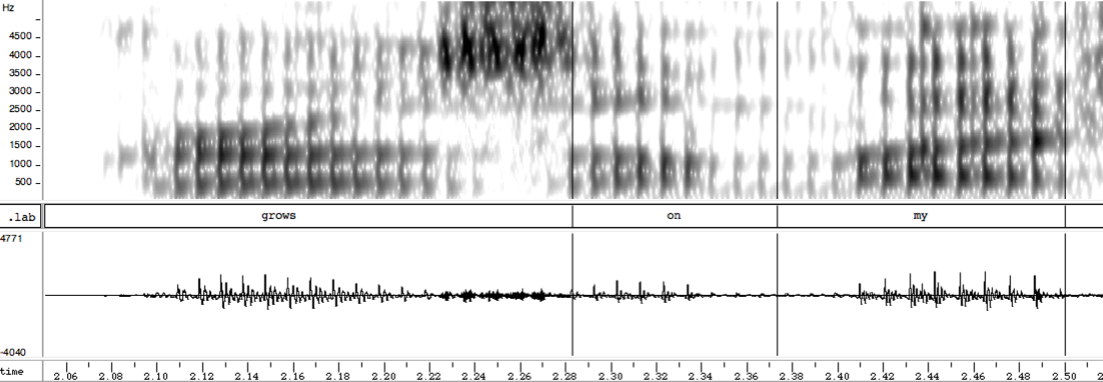
G Jones said,
April 2, 2014 @ 6:41 am
I've never heard anyone pronounce "race" that way. Sounds almost like a "th."
[(myl) The word as a whole is a little over-articulated, in the way that citation forms often are, but I think the final /s/ is clearly an /s/. Try listening with headphones. Here's the MW pronunciation concatenated with the Wiktionary pronunciation:
]
Stephan Stiller said,
April 2, 2014 @ 6:49 am
Phrase-final (partial) devoicing is quite a well-known thing. One has to be especially careful with this when doing fieldwork and one wants to find out what consonant occurs at the end of a word. The word is best embedded so that it doesn't occur phrase-finally.
[(myl) Final devoicing is indeed a universal tendency, for good physical reasons. But in the varieties of English that we're talking about, the duration and other cues are so strong that there's generally not going to be much ambiguity about citation forms involving final main-phrase-stressed syllables.
In the "PSDS" case, the final syllable is unstressed (non-rhotic "ears") or destressed ("DEE ess"), and also follows a vowel-vowel transition where the length of the final vowel is obscured.]
Pflaumbaum said,
April 2, 2014 @ 7:11 am
But this wouldn't be classed as neutralisation, right? There's still a phonemic contrast?
[(myl) Absolutely.]
leoboiko said,
April 2, 2014 @ 7:15 am
What. After all the trouble I had to force myself to voice syllable-final /z/ in English? (In my native language, Portuguese, they're "officially" considered to be devoiced.)
leoboiko said,
April 2, 2014 @ 7:29 am
Oh, if they're still different phonemes I guess it wasn't an empty effort. By contrast, I believe the Portuguese case is a true neutralization, and the choice of ‹s› or ‹z› in writing (in coda position) is purely a matter of orthography.
Stephan Stiller said,
April 2, 2014 @ 7:35 am
@ myl (within G Jones)
Yes. Though for a language one is doing fieldwork in, those other clues might initially be hard to discern. For example, I originally perceived the contrast between Cantonese -aa- [aː] and -a- [ɐ] (in Jyutping transcription, with IPA in square brackets) as mainly one of vowel length, not vowel quality. Native speakers perceive the contrast as mainly one of vowel quality, though they will acknowledge the difference in vowel length. (The correspondence between Jyutping -aa- and -a- and IPA [aː] and [ɐ] (resp) is not at all clean, btw; I had to do a good amount of fieldwork to figure out the details.) I recall that I initially perceived the difference between English [ɛ] and [æˑ] to be only one of length, though I now have no problem with it (perception of the vowel quality difference and also production of the contrast) at all.
Stephan Stiller said,
April 2, 2014 @ 7:37 am
"@ myl (within G Jones)" → "@ myl (within Stephan Stiller)" [feel free to change the original or keep this after-comment]
Ellen K. said,
April 2, 2014 @ 9:46 am
As an experiment, I tried singing the two words, which neutralizes the vowel length distinction. I definitely can hear that the /z/ is devoiced, that is, that it sounds rather s-like. Which is fascinating.
Pflaumbaum said,
April 2, 2014 @ 10:05 am
So in the case of, say, dogs and cats, we have phonetic similarity, beneath phonemic difference, beneath morphological (plus orthographic) identity. Is that right? How does anyone learn a language?
J. W. Brewer said,
April 2, 2014 @ 10:28 am
Before it got standardized in the 1920's, "jazz" was occasionally spelled "jass" (as in the historically-important 1917 recordings credited to the "Original Dixieland Jass Band"). I couldn't say whether this orthographic variation reflected a difference (actual or perceived) in pronunciation (with the pronunciation subsequently standardizing as the word became better established as its musical referent became better known), or is merely further evidence that the voiced/unvoiced distinction is a rather subtle one in this location. I suppose the possibility of regional/racial variation in phonology is a further complicating factor.
Jongseong Park said,
April 2, 2014 @ 10:59 am
To make things really fun, let's say that the former allophonic variation of /s/ in English has survived so that an underlying |s| often surfaces as [z] in certain conditions, such as word-finally after a voiced sound, as well as in certain voiced contexts word-internally:
Andrew|s| → [z]
May|s| → [z]
Jame|s| → [z]
Hobbe|s| → [z]
ro|s|e → [z]
ea|s|y → [z]
Bo|s|nia → [z]
tran|s|verse → [z]
What about the following cases where we hear the voiceless [s]? We simply assume that these are cases where we in fact have underlying geminates, and introduce the rule |ss| → [s]:
yes → ye|ss| → [s]
circus → circu|ss| → [s]
In fact, after short vowels, even where you have a single 's' in the spelling you have the voiceless pronunciation in the majority of cases, with the exceptions being common function words 'is', 'as', 'has', 'does' or abbreviated forms like 'Des' (from 'Desmond') or 'Les Mis'. Notice that you sometimes have a change in the spelling as 'Les Miz', as well as 'biz' from 'business'.
In some ways it may be simpler to treat these as underlying /z/, but I prefer to posit a separate archiphoneme |z| for cases that can't be explained as positional allophones of |s|, such as |z|oo and bu|zz|. |z| is much less numerous in English, especially in native vocabulary.
Broadly, then, the archiphonemes |s| and |z| follow English spelling. Why go through the trouble of this type of analysis? After all, there is no difference in the pronunciation of [z] whether it is underlying |s| or |z|. (Or is there? It would indeed be interesting if it turned out that there was a difference between 'buzz' and 'does', but I highly doubt that it's the case.)
But this is useful in explaining alternations of [s] and [z] in |s| words like Mansfield and transpolar, where the |s| may surface more as [z] if the components are pronounced more slowly and separately, but tends to [s] in more rapid speech. In words like 'Lisa' or 'erase', one might have underlying |s| or |ss| depending on the dialect or the individual. But |z| has nowhere near this variation and resists neutralization with [s] in pretty much all contexts, including in words like 'buzzcut'.
Mark F. said,
April 2, 2014 @ 12:05 pm
Yeah, I really meant "voice the /s/", not "pronounce the /s/." Sorry.
And, leoboiko, I'm pretty sure all that effort was the right thing. It was probably moving you towards the vowel-lengthening and so forth that constitute the real difference.
Mark F. said,
April 2, 2014 @ 12:06 pm
…and I meant "/z/", not "/s/" in that last comment. Sigh.
dw said,
April 2, 2014 @ 1:22 pm
Pflaumbaum said:
So in the case of, say, dogs and cats, we have phonetic similarity, beneath phonemic difference, beneath morphological (plus orthographic) identity. Is that right? How does anyone learn a language?
Phonetic similarity, perhaps, but not phonetic identity. Clearly, "cats" and "cads" differ phonetically (even though the difference may not be as simple as [kæts] vs. [kædz]) and the human brain is very good at perceiving this difference.
Pflaumbaum said,
April 2, 2014 @ 4:40 pm
Yes I meant the [s] and [z] segments, not the whole words. Though still not identical, of course.
Paul Battley said,
April 2, 2014 @ 8:24 pm
I'm veering off the topic slightly, but this reminds me of something that amused me. In the West Midlands (of England), bus and buzz are homophones, being pronounced something like [bʊz]. Years ago, when I lived in Birmingham, a local radio station ran ads on the sides of buses saying, "Catch the buzz." It wasn't until much later that I finally understood that it was meant to be a pun. I couldn't perceive the two words as anything other than totally distinct despite regularly hearing local speakers merge their pronunciations.
tudza said,
April 2, 2014 @ 8:27 pm
What's the bus
Tell me what's a happenin'
Matt Juge said,
April 2, 2014 @ 8:45 pm
I'm not sure what to make of what I think of as one way to tell a Texan (which I am not) from a non-Texan. Although Jim Parsons plays a character on The Big Bang Theory whose dialog gives away the writers' ignorance (Galveston is in eastern Texas but is not part of east Texas, his pronunciation of Texas with a voiced(-sounding) final consonant reveals the actor's true Texan-ness (he's from Houston). The unstressed last vowel doesn't seem longer, but maybe it is.
Matt Juge said,
April 2, 2014 @ 8:49 pm
1. think *of*
2. part of *East* Texas
3. *unstressed*
Unlike the governor, I can get to three, but I still need to say "oops".
[(myl) Fixed now. Though that "undressed vowel" was a thought-provoking typo.]
Adam Funk said,
April 3, 2014 @ 3:07 am
In Yorkshire (South Yorkshire, at least), "us" is often pronounced /ʊz/.
Jongseong Park said,
April 3, 2014 @ 3:22 am
I guess a simple summary of my last comment would be that sounds spelled 's' are susceptible to voicing and merging with /z/, while the sounds spelled 'z' resist being merged with /s/ even in contexts where they are partially devoiced. So it's not surprising that in dialects that merge 'bus' and 'buzz', [z] is used for both words.
Even 'science' is pronounced with a final [z] for some speakers despite the spelling with 'c'.
Pflaumbaum said,
April 3, 2014 @ 3:45 am
@ Adam –
Not just South – my Humberside grandparents had [ʊz].
The 18th century Geordies in Pynchon's Mason and Dixon say [hʊz], and given the quality of his research I'm guessing these forms go way back.
pj said,
April 3, 2014 @ 6:54 am
How interesting! Coincidentally, I was considering the real-terms terminal /z/-/s/ difference recently when singing 'With drooping wings' from Purcell's Dido & Aeneas with a choir, where there is a risk of the audience hearing 'With drooping wings ye Cupids come' as 'With drooping wings, ye Cupid scum'.
Phonemically, there's a difference between expected /z/ and /s/in the two phrases, but the answer to making the phonetic distinction lies pretty much entirely, I came to the conclusion, in the aspiration of the /k/ at the start of 'come', and not really in what you do with the '-s' of 'Cupids' at all. (It's easy and tempting to back off on that aspiration when singing quietly and legato.) Indeed, trying to make the '-s' more clearly /z/-ish as an ambiguity prevention measure just sounds weird.
Jongseong Park said,
April 3, 2014 @ 8:01 am
@pj: I have this intuition that the terminal /z/-/s/ distinction is more of a lenis-fortis distinction than a true voicing distinction, which is one reason for the analysis in my first comment that terminal /s/ represents an underlying geminate |ss|.
But a naive attempt of making -s more clearly /z/-ish would probably consist of emphasizing the voicing. This would makes it less lenis, so it doesn't actually help much.
What I'm not sure about is whether my analysis (if valid) extends to cases like 'buzz', where I would contend that the underlying terminal is |z| (or even |zz| perhaps, though I see no use in positing a geminate |zz|). Is there anyone who makes a difference in pronunciation between a terminal |z| and a terminal |s| realized as [z]? Pronouncing 'buzz' with a fortis [z] instead of the lenis [z] in 'does'? I highly doubt it, but my analysis does present this possibility.
Andrew Bay said,
April 3, 2014 @ 9:00 am
Bus to me ends with a sound of an s that is like the sound of a stream of water, a smooth sound where my tongue doesn't move. The buzz or biz end with a sound of a z that is the sound of bee in your ear, my tongue is vibrating on my teeth/lips.
Pflaumbaum said,
April 3, 2014 @ 5:52 pm
@ Jongseong Park –
Isn't what you're saying about fortis/lenis true to some extent of most English voice contrasts?
@ Andrew Bay –
Saying the words to yourself doesn't count for much – those kind of 'facultative' pronunciations are pretty different from ordinary connected speech where you're not paying conscious attention to the phonetics.
Jongseong Park said,
April 3, 2014 @ 7:01 pm
@Pflaumbaum: Yes, other voice contrasts in English are at least partially fortis-lenis contrasts. The easiest way to see this is in whispered English, where you can maintain the 'voice' contrasts in spite of the lack of voicing, at least more easily than you can in French, for example.
So likewise, when singing and emphasizing the consonants, I feel it is more natural to go overboard with the aspiration in 't' than to try to pronounce 'd' with a similar articulatory strength.
Adam Funk said,
April 4, 2014 @ 4:23 am
@Pflaumbaum
Thanks for the Humberside tip. I was being cautious because I've been dinged before for generalizing from South Yorkshire to the rest. ;-)
Mick O said,
April 4, 2014 @ 1:43 pm
For some reason, this all reminded me of the Charlestown Chiefs goalie in Slap Shot: https://www.youtube.com/watch?v=x5Xp9hvTvPk
Jimmy said,
April 4, 2014 @ 11:42 pm
@ Adam Funk: FWIW, I've heard something similar from some Australians, except the vowel is different: /ʌz/.